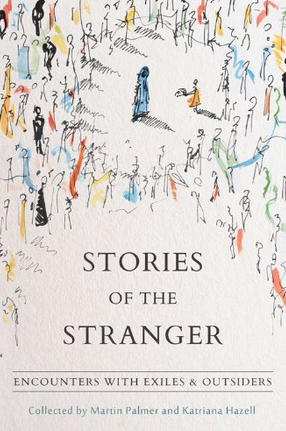Stories of the Stranger
Twenty stories of refugees spanning different cultures, languages and traditions, mostly written 3,000 years ago, but with resonance to contemporary matters of immigration and human rights
 Stories of the Stranger - Encounters with Exiles and Outsiders
Stories of the Stranger - Encounters with Exiles and Outsiders
By Martin Palmer and Katriana Hazell (eds),
Bene Factum Publishing, London
ISBN: 978-1909657441
Reviewed by Alec Gilmore
Two common features undergird all religions and cultures. One, the importance of story-telling. Two, ‘the stranger’, to be protected and given a safe space in which to be welcomed.
Why? Because ‘the stranger’ can be a revealer of truth and often more likely to provide a divine encounter that traditional religious figures. This is the substance of this book along with the realisation that very many such stories contain an element of ‘exile’, sometimes dominant, sometimes tucked away to be discovered, though none of this was quite where the compilers started.
It began when Martin Palmer, Head of the Alliance of Religions and Conservation, received a request from the Norwegian Government to develop a programme with the major faiths to facilitate their response to the refugees and migrants arising from ecological collapse in their home countries.
The result is 20 stories spanning 4,000 miles from different cultures, languages and traditions, mostly written 3,000 years ago, from Baha’i, Buddhist, Christian, Daoist, Hindu, Jewish, Muslim, Sikh and Zoroastrian sources, plus a couple from Africa (one traditional, one modern), classified in four sections (Holy Books, Historical, Folk and Modern), all different but all reflecting a similar approach to the divine.
Prior to publication Christian, Hindu and Muslim African leaders brought them to life in a Story-telling Evening in Nairobi, where the traditional African story of the Kikuyu had added poignancy. For the Kikuyu the God of Light is the God of Life and Plenty, with a deep concern for their neighbours backed up by a strong tradition of welcoming the stranger, thereby opening the door to the possibility of ‘entertaining strangers unaware’.
In practice this led to the construction of shelters by the roadside with basic food to ensure travellers had adequate refreshment, based on the conviction that if someone died of hunger (be it stranger, visitor or relative) a curse would ensue. Poor people in particular were to be received into the family and given a portion of land. In return the stranger was welcomed as one who brought news from the world outside. Why? Because you never knew what they had to offer or what one day you might need.
The book has a depth, bringing together unfamiliar material not found elsewhere. For preachers wanting to address contemporary matters of poverty, housing, immigration, human rights and the like, there is a wealth of material which alongside scripture could bring the issues to light in a new, lively and positive way and might be further enriched as a source for group study bridging Christmas to Easter.
Alec Gilmore is a Baptist minister
Baptist Times, 20/03/2015